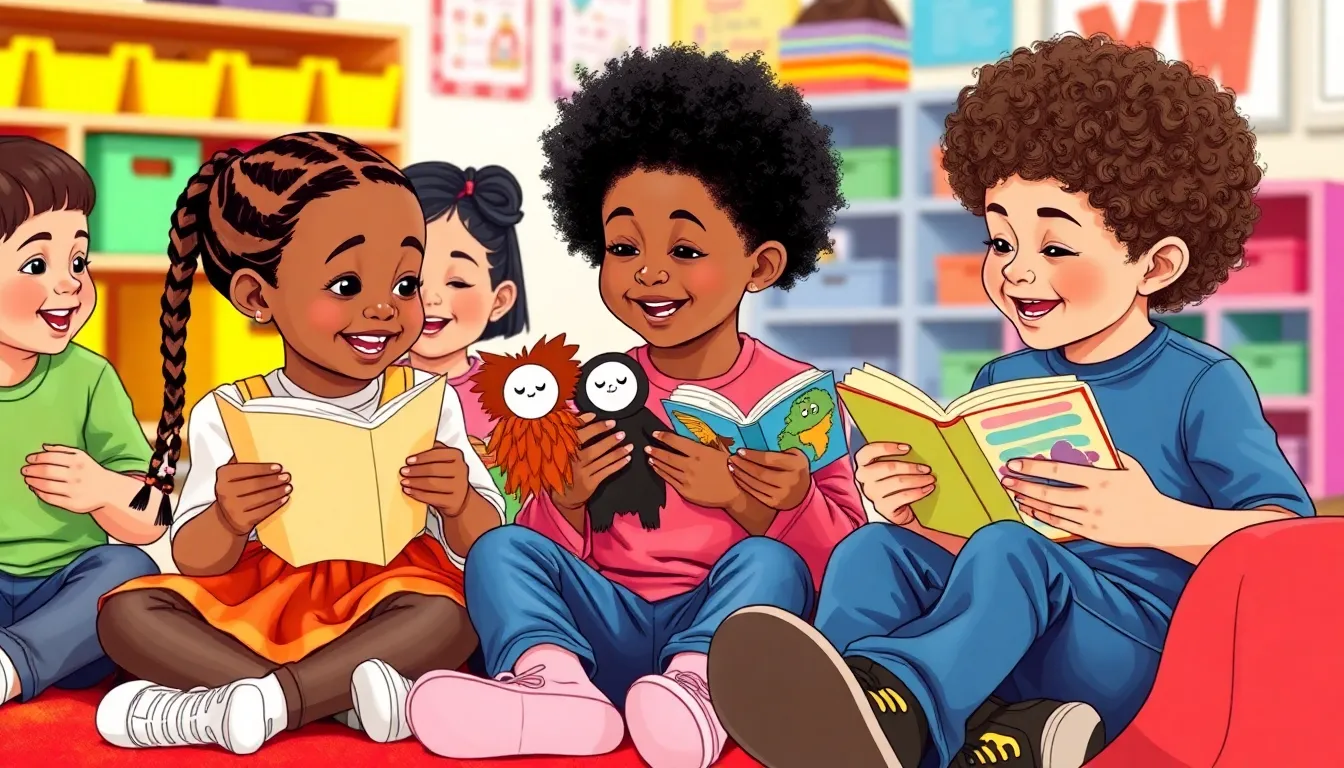Table of Contents
ToggleStorytelling isn’t just for bedtime anymore. For preschoolers, it’s a magical world where imagination runs wild and creativity knows no bounds. Picture this: little ones spinning tales of brave knights, mischievous dragons, and talking animals—all while developing crucial language skills. Sounds like a win-win, right?
Storytelling games are the secret sauce to turning ordinary playtime into extraordinary adventures. These games not only spark creativity but also help kids build confidence and social skills. Plus, they’re a fantastic way for parents and caregivers to bond with their little storytellers. So grab a comfy seat and prepare for a journey through the enchanting realm of storytelling games that’ll have your preschooler giggling and dreaming up their next big adventure.
Overview of Storytelling Games for Preschoolers
Storytelling games engage preschoolers by combining play with narrative skills. These games encourage children to create characters, settings, and plots using their imagination. As children participate, they develop language skills, vocabulary, and critical thinking through storytelling.
Examples of these games include puppet shows, where children can bring stories to life. In this activity, they not only narrate but also express emotions through character voices. Another engaging option is story stones, which feature images that prompt children to craft their narratives. This visual cue enhances creativity and encourages storytelling exploration.
In addition to enhancing skills, storytelling games foster social interaction among preschoolers. Collaborative storytelling activities allow children to work together, building cooperation and communication. This social element strengthens relationships between peers and creates bonding experiences.
Choice enrichment is vital in these games. By allowing preschoolers to choose themes or characters, they feel empowered and engaged in the storytelling process. Themes may include adventures with animals, magic worlds, or even everyday scenarios. Such variety caters to diverse interests, ensuring that every child finds joy in storytelling.
Parents and caregivers play a significant role in facilitating storytelling games. Their participation enhances children’s excitement and nurtures a shared connection. Together, they create lasting memories while enriching language development and cognitive growth.
Effectively, storytelling games serve as valuable tools for preschoolers. By merging fun with educational benefits, they illuminate the power of imagination and creativity in early childhood learning.
Benefits of Storytelling Games

Storytelling games offer numerous advantages for preschoolers, promoting their overall growth and development.
Cognitive Development
Storytelling games stimulate cognitive development by encouraging imaginative thinking. They require children to create characters, settings, and plots, enhancing problem-solving skills. Memory improves as preschoolers recall story elements, sequencing events logically. Vocabulary expands through exposure to new words while engaging with narratives. Additionally, these games foster listening skills, as children pay attention to storylines and directions.
Children learn to express thoughts and ideas clearly as they share their stories. Engaging with different scenarios boosts critical thinking, allowing preschoolers to make connections and predictions. Overall, storytelling games nurture young minds, making learning an enjoyable experience.
Social Skills Enhancement
Storytelling games significantly enhance social skills among preschoolers. Collaboration becomes essential as children often work in groups during these activities. They share ideas, negotiate roles, and take turns, which builds teamwork skills. Communication thrives as children articulate their thoughts and listen to peers.
Empathy develops through character exploration, allowing them to understand different perspectives. Engaging with others strengthens friendships, contributing to a supportive social environment. Additionally, these games boost confidence, as children present stories to audiences. Overall, storytelling games serve as a powerful tool for fostering meaningful interactions and relationships in early childhood.
Popular Storytelling Games
Storytelling games engage preschoolers in playful narratives, enhancing their creativity and language skills. Several popular games stand out for their effectiveness in prompting imaginative play.
Game 1: Puppet Show
Puppet shows invite preschoolers to create characters using puppets. Setting the scene becomes an exciting opportunity to explore emotions. Children can manipulate their puppets, practicing expressive dialogue. This hands-on activity nurtures confidence as they perform for an audience. Notably, puppet shows can be themed, allowing children to retell classic stories or invent new ones. Complexity can vary by incorporating challenges like improvisation, boosting cognitive skills.
Game 2: Story Stones
Story stones provide visual prompts for children to craft stories. Each stone features an image, representing animals, objects, or places. Children select stones randomly, igniting their imagination as they weave a tale around them. This game encourages collaboration; friends can build on each other’s stories, fostering teamwork. Furthermore, varying the stones keeps the activity fresh and inspiring. Enhancing vocabulary is an inherent benefit, as children describe the stones in their narratives.
Tips for Implementing Storytelling Games
Incorporating storytelling games into playtime enhances engagement for preschoolers. Choose age-appropriate themes that spark children’s interests. Storytelling games thrive on creativity, so encourage preschoolers to use their imagination.
Create a comfortable environment to foster participation. A cozy space filled with cushions and soft lighting invites children to share their stories openly. Include props, such as costumes or puppets. Props stimulate creativity and help children visualize characters and settings.
Establish a routine around storytelling activities. Predictable times create anticipation among preschoolers, making them eager to participate. Encourage collaboration by inviting multiple children to join in on the storytelling process. Working as a team fosters communication and social skills.
Utilize technology to expand storytelling horizons. Interactive storytelling apps and digital platforms offer new ways for preschoolers to engage with stories. Limit screen time to keep the focus on active participation and ensure physical interaction with peers.
Involve parents and caregivers by sharing activities that can be done at home. Connecting storytelling games to family time strengthens relationships and provides additional context for children. Invite families to bring their own stories or themes into the games. This connection diversifies content and keeps activities fresh.
Monitor progress and celebrate achievements. Acknowledge children’s creativity, whether they create unique characters or develop complex plots. Recognition boosts confidence, encouraging more active participation in future storytelling activities.
Adapt storytelling games to fit individual needs. Tailoring activities ensures that every child feels included, whether they prefer verbal storytelling, drawing, or acting. Adjusting the complexity of games helps keep preschoolers engaged and challenged appropriately.
Storytelling games are more than just fun activities for preschoolers. They play a vital role in nurturing creativity and language development while strengthening social skills. By engaging in these imaginative experiences, children not only learn to express themselves but also build lasting connections with their peers and caregivers.
The variety of games available allows for endless possibilities in storytelling, ensuring that every child can find something that resonates with their interests. As they explore different narratives and characters, preschoolers develop critical thinking and problem-solving skills that will benefit them throughout their lives.
Encouraging a love for storytelling at an early age sets the stage for a lifetime of learning and imagination. Embracing these games in daily routines can make a significant impact on a child’s growth and development.




